latest news
Volunteers who drank beverage sweetened with glucose in US experiment went on to consume more biscuits and sweets than people who didn’t
Fructose may increase cravings for high-calorie foods, according to a new study.
Researchers at the University of Southern California got 24 volunteers to consume a sugary drink sweetened with fructose – the sugar found in fruit – on one day and glucose on another day.
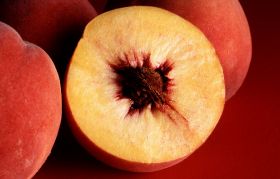
Compared with glucose, the fructose drink led to more hunger and desire for treats such as biscuits and sweets, suggesting that different sugars may affect us differently.
The participants were given a sweetened, cherry-flavoured drink but were not told what was in it – fructose or glucose.
Shortly afterwards, they were asked to rate how hungry they were. They then underwent brain scans while being shown pictures of foods such as biscuits, sweets, burgers and pizza, as well as some ‘neutral’ photographs of buildings.
Some days later, the same volunteers came in again and repeated the experiment. The only difference was the type of sweetener added to their cherry drink.
The brain scans showed that people responded more strongly to photos of food if they had been drinking fructose, rather than glucose. Some of the subjects also reported more food cravings for treats shortly after consuming fructose.
Although fructose and glucose contain the same energy or calories, the body breaks the sugars down in different ways, and the researchers believe this might explain their findings.
Pork farmers supplying Waitrose have saved an estimated £850,000 on feed per year since 2010, following a £3 million investment to roll out an innovative feeding system known as Eco Pig.
The feeding system has a lower environmental impact than traditional systems, according to Waitrose, which reported on the investment in the 2015 John Lewis Partnership annual report, published on 24 April 2015.
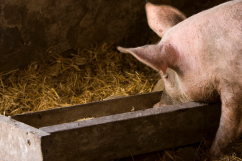
Waitrose has a sole pork supplier, Dalehead Foods, and its subsidiary, BQP, footed the £3 million bill.
Waitrose said its “respectful partnership approach” with suppliers had given BQP the ability to invest in the individual farms with which it works. “This helps to increase capacity, improve standards and efficiency, and encourage the next generation of farmers,” the annual report stated. “This respectful partnership approach has given BQP the ability to invest in the individual farms with which it works.”
The report added that, since 2010, 44 of Dalehead’s farmer partners have invested more than £13 million in buildings, during a period of low confidence in the sector as a whole, to create new capacity.
Ayrshire meat company, We Hae Meat, has rolled out its single-portion Scotch pie range to 62 Asda stores across Scotland.
Asda described the range as a “revolutionary” take on the Scotch pie, with fillings including BBQ Pulled Pork, Balmoral Chicken, BBQ Pulled Beef and Chicken Curry.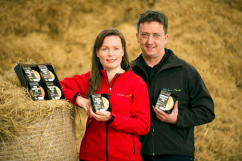
“Through the single-portion pie range, we’ve given the Scotch pie a contemporary makeover, using the kind of flavours and fillings that we – as a young modern family – would like to eat,” said Carlyn Paton, director of We Hae Meat.
“As butchers who are relatively new to the industry, we are proud to look at product development with fresh eyes and pick what we think will give the very best result – whether that’s a recipe inspired by tradition or current trends.”
The pies use quality-assured meat from the Paton family farm based at Cairnhill near Girvan.
“We’re hugely excited to bring our innovative pies and butcher’s shop roots to the convenience of the supermarket. Here’s to introducing a new wave of Scotch pie to the Scottish people!” added Paton.
Brian O’Shea, regional buying manager for Asda Scotland, commented: “The Scotch pie is a huge part of our national identity, but is at risk of getting stuck in the past if it remains bridled by convention.
“We are delighted to be exclusively stocking this revolutionary new take on the traditional Scotch pie.
“The innovative flavours, made with delicious ingredients, are exactly what our customers want. We Hae Meat has really hit the nail on the head with their exciting new range.”
The pies will be launched exclusively in Asda at a retail price of £1.50.
A London warehouse will be converted into a salad, herb and fish farm, and will produce 200,000 bags of salad a year
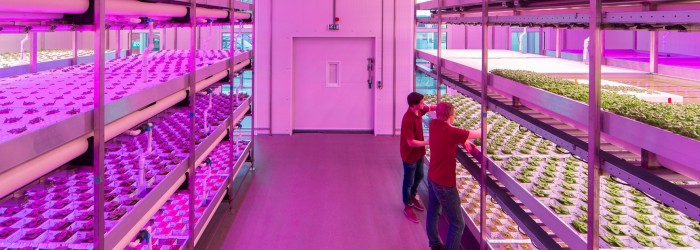
A large-scale aquaponic farm that will produce more than 20,000kg of salad annually is being built in a converted London warehouse.
The farm, based in Beckton and described as the first of its kind in the UK, is expected to produce its first harvest in September. It will use aquaculture and hydroponic technology to grow enough salads and herbs for around 200,000 salad bags, and produce 4,000kg of fish each year.
Run by GrowUp Urban Farms, the project was given the green light to start building this week after winning planning permission from the London Borough of Newham.
The farm will provide eight jobs, with three positions created specifically for local young people with a history of poor educational attainment. All employees will receive the London Living Wage, of £9.15 an hour, as a minimum.
“This farm will be a flagship for innovative urban farming, putting food and feeding people at the heart of the development of London as a smarter and more sustainable city,” said GrowUp Urban Farms CEO, Kate Hofman.
The farm will also include a visitor centre to explain more about sustainable food production in cities, and engage the local community in urban farming.
Hydroponic systems pump waste water from fish tanks through growing beds, where salad plants absorb waste nutrients from the water, and then the water for the fish as the system continually recirculates.
Specialist horticultural LED lighting is to be designed and manufactured by Philips, and the tilapia fish that are produced by the farm will be sold to local restaurants.
Rosie Boycott, chair of the London Food Board, said: “GrowUp Urban Farms is pioneering an innovative approach that will see a former warehouse in London transformed into a highly productive urban farm, which will cultivate not only great grub but jobs for local people too.
“I wish Kate and the team all the best for this exciting new venture and I look forward to sampling the produce.”
GrowUp secured its first investment of £1.1 million in September 2014, with over 65% of this provided by Ignite Social Enterprise, backed by Centrica. It has also been awarded funding from InnovateUK through the Agri-Tech Catalyst fund.
The company currently runs the Stratford-based pilot – GrowUp Box – a demonstration aquaponic farming system built from a shipping container and greenhouse.
Unit sales have increased by 36.2 per cent year-on-year, and value sales are up by 18.1 per cent y-o-y thanks to ‘Potatokens’
Greenvale is celebrating what it claims to be an outstanding response to its current current ‘Potato Pals’ interactive initiative in retail stores.
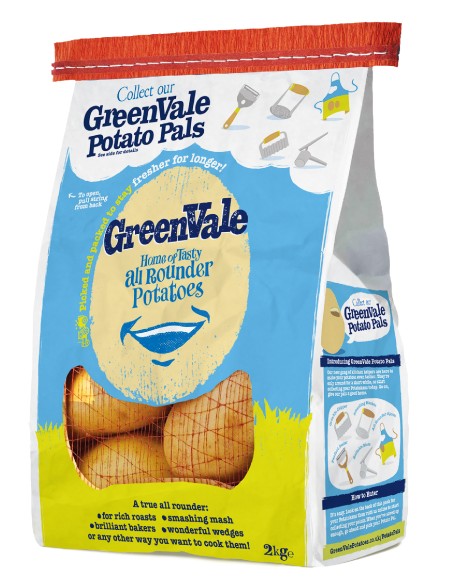
Launched in February 2015, the aim of the cross-platform loyalty campaign in Tesco, Ocado and Booths has been to increase sales and generate trials of Greenvale’s branded All Rounder and Jacket Potatoes ranges.
The ‘Potato Pals’ loyalty scheme involves the collection of ‘Potatokens’ in order to claim a range of potato preparation and kitchen equipment.
Figures from grocery research bodies Nielsen and Dunnhumby show that unit sales have increased by 36.2 per cent year-on-year, and value sales are up by 18.1 per cent year on year.
Greenvale also developed a CRM system in order to maintain consumer enthusiasm for the promotion – emails, prize draws, recipes and potato usage tips have been deployed to encourage participants to keep collecting and redeeming points, and to share the promotion with their social media contacts.
According to the potato giant, this activity has generated over 3,500 Facebook ‘likes’ to date, and the highest ever number of unique visitors to the Greenvale website since its launch in 2012.
Tracey Mattock, Greenvale’s marketing manager, said: “This type of direct communication with shoppers was a new venture for Greenvale, and we are absolutely delighted to be delivering sign ups and entered codes above all expectations – between 200-400 per cent on a number of measures – plus the highest repeat rate in the last 12 months.
“The ‘Potato Pals’ scheme was designed to be a fun and attractive mechanism to extend GreenVale’s social media presence and to increase awareness, trial and purchase of our branded potatoes – and it is proving to be a fantastic success on every level.”
The scheme runs until August 2015
Scientists at the Massachusetts University of Technology (MIT) have created a sensor which detects gases emitted from rotting meat, which could help to reduce food waste.
With food waste a hot topic, the scientists behind the sensor said it could be used on ‘smart packaging’, enabling consumers to accurately tell when meat has gone off.

/>
Speaking to the journal Angewandte Chemie about the sensor, Timothy Swager, the John D MacArthur professor of chemistry at MIT, said: “People are constantly throwing things out that probably aren’t bad.”
The sensor was modelled on a similar device used to measure the ripeness of fruit. It uses carbon nanotubes that have been chemically modified to be able to carry electric current changes in the presence of a particular gas – putrescine and cadaverine in decaying meat.
Researchers said a regular smartphone, using software developed by Swager’s lab, could read outputs from the sensor.
The technology has been welcomed by Roberto Forloni, senior science fellow at Sealed Air, supplier of food packaging. “There are several potential advantages in having an inexpensive sensor for measuring, in real time, the freshness of meat and fish products, including: preventing foodborne illness; increasing overall customer satisfaction; and reducing food waste at grocery stores and in consumers’ homes,” said Forloni.
The hand-harvested UK-grown spears are specially-selected for their higher-than-normal levels of the amino acid asparagine
Barfoots’ crown jewel asparagus is set to go on sale exclusively at Ocado.
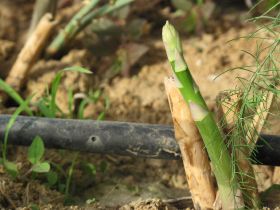
The hand-harvested UK-grown spears are specially-selected for their higher-than-normal levels of the amino acid asparagine which, Barfoots claims, among other attributes, gives it a sweeter and stronger flavour.
The crown jewel line will be exclusive to the online retailer, which also supplies other Barfoots Grown With Love range products, including sweetcorn elotes.
James Meers, business unit director, said: “We were blown away by the success and the amount of interest crown jewel got last year, so I am really excited to see it return.
“The rating system on Ocado gave us direct consumer feedback and five stars out of five tells me this is a product that consumers really get – I am proud that we can say it has been Grown With Love.”
Halal meat brand Ghanim International UK has extended its range of frozen, microwavable products in Tesco.
Ghanim International UK has launched its ‘Chilli Nacho Chicken Drumstick’ and ‘Garlic Butter Chicken Kiev’ in over 42 Tesco stores, as part of its Brunei Halal range.
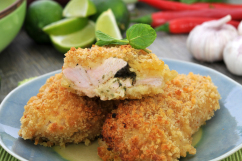
The company said combining quality-assured British meat with innovative products, while meeting the needs of second- and third-generation Muslim consumers, was a key focus.
Dr Mohammad Nazir OBE, CEO of Ghanim International UK, began talks with senior management at Tesco more than a year ago and has seen the partnership flourish, with the range now being expanded into chilled products.
“We responded to Tesco’s challenge for more innovative products.
“Our brand has been recognised as having strength by sourcing British local produce and a high level of halal integrity, quality and presentation. I feel really excited that Tesco has been able to see our vision in reaching out to the second- and third-generation Muslim consumers in the UK,” Nazir commented.
Meanwhile, Ghanim International UK said Tesco was “striving to offer complete halal assurance, to ensure there is quality and traceability from farm to family”.
Eating an apple before going shopping causes a person to buy 25% more fruit and vegetables, a study found.
US researchers discovered people can be primed to buy healthy food if they eat a wholesome snack before going to the supermarket.
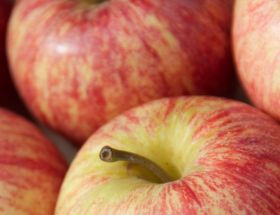
The team, at Cornell University, recommend eating a piece of fruit before hitting the aisles, and argue that supermarkets should offer samples to shoppers to encourage them to make healthy choices.
The researchers carried out three studies to find out if healthy snacks cause shoppers to make better food choices in the shop.
In the first study, 120 shoppers were randomly given either a bit of apple, a piece of cookie or nothing at all when they arrived at the supermarket.
The researchers tracked their purchases and found those who were given the apple bought 28% more fruits and vegetables than those given the cookie.
And they bought 25 per cent more fruits and vegetables than those given no snack at all at the start of their shopping.
Dr Aner Tal, of Cornell University, who carried out the research with his colleague Dr Brian Wansink, said: “What this teaches us is that having a small healthy snack before shopping can put us in a healthier mindset and steer us towards making better food choices.”